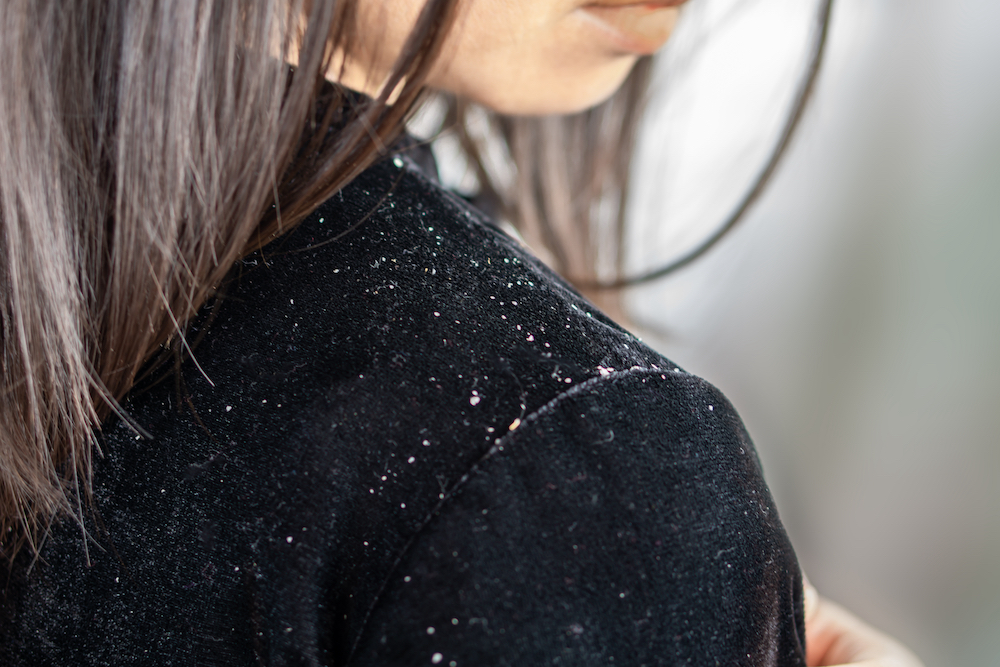What is Dandruff and How Can You Treat It

Dandruff is an extremely common condition, but that doesn’t make it any less embarrassing or frustrating. It is characterized by small, white flakes of skin that can be visible on your scalp, hair, face or shoulders. If you have dark hair or commonly wear dark clothing, the flakes of skin can be even more apparent.
If you are one of the many people who have dandruff, you may be concerned if it is a symptom of an underlying health issue. You may also wonder what kinds of treatments are available to cure the condition. In this article, we will discuss the possible causes of dandruff and how the condition can be treated at home.
Dandruff that is accompanied by red, inflamed skin on the face, back or shoulders may be a sign of seborrheic dermatitis. Seborrheic dermatitis can respond well to medications from your doctor. If you believe the condition is more than common dandruff, it is recommended that you schedule an appointment with your dermatologist right away.
What is Dandruff?
Dandruff is characterized by more-than-normal levels of visible skin cells on the scalp. It can be itchy, and generally worsens during the cooler seasons. We are constantly shedding dead skin cells. The cells are so small that they typically are invisible to the naked eye. However, some people shed larger flakes that can be seen on the scalp and hair.
It is a common misconception that dandruff is a sign of poor hygiene. Doctors cannot pinpoint an exact cause of the condition; however, it is untrue that dandruff is caused by uncleanliness. There are a number of factors that can contribute to the condition.
Stress and anxiety have been linked to dandruff. Hormones and even genetics may also play a role. Dry skin can cause excessive flaking of the scalp, but people with oily skin can also experience dandruff.
Some people believe that the over-shampooing of your hair can cause dryness and lead to dandruff. In fact, the opposite appears to be true. If you do not shampoo your hair enough, sebum and dead skin cells will begin to build on your scalp and cause flaking.
Dandruff can also be linked to a yeast-like fungus called malassezia. Most people have this fungus on their scalp already, but it does not cause any reaction. The fungus feeds on the oils on your skin and generally goes unnoticed. However, if you are a person who is extra-sensitive to the fungus, your body can overreact to its presence on your skin by producing more oil and speeding up skin cell turnover. Both of these reactions can cause dandruff.
Hair care products that are too harsh can also cause you to develop contact dermatitis. Contact dermatitis is a reaction to an external stimulus and can produce redness, itchiness or dandruff.
A skin condition called seborrheic dermatitis can cause inflammation, scaly, red patches and flaky skin that looks like dandruff. While it typically appears on the scalp, it can also show up on any other oily parts of your body such as your face, nose, eyelids and chest.
It is believed to be an overreaction to the malassezia fungus. If you believe that your dandruff is accompanied by redness and irritation, you may want to see your doctor. Serious cases of seborrheic dermatitis can make you very uncomfortable, cause infection and do not respond to typical over-the-counter dandruff remedies.
At Home Treatments for Dandruff
The first thing to do if you suspect you have dandruff is to purchase an over-the-counter dandruff shampoo. These shampoos are relatively inexpensive yet very effective. Dandruff shampoos stop the production of yeast on your scalp and slow down cell turnover.
For a more natural approach, some people have found adding small amounts of tea tree oil to a gentle shampoo or diluted in water can be effective at reducing the signs of dandruff. Tea tree oil is anti-inflammatory an anti-microbial.
Lifestyle changes can also help. If you find that you are experiencing high levels of stress, anxiety or practicing unhealthy eating habits, making changes may improve the health of your scalp.
If your dandruff does not respond to lifestyle changes and dandruff shampoo, it is recommended that you schedule an appointment with your dermatologist. There are medications available that can treat the symptoms. Your doctor will also be able to identify if you may be experiencing a case of seborrheic dermatitis.
If you live in the Atlanta area and need a leading dermatologist to help you address a skin condition, contact the office of Buckhead Dermatology today.
